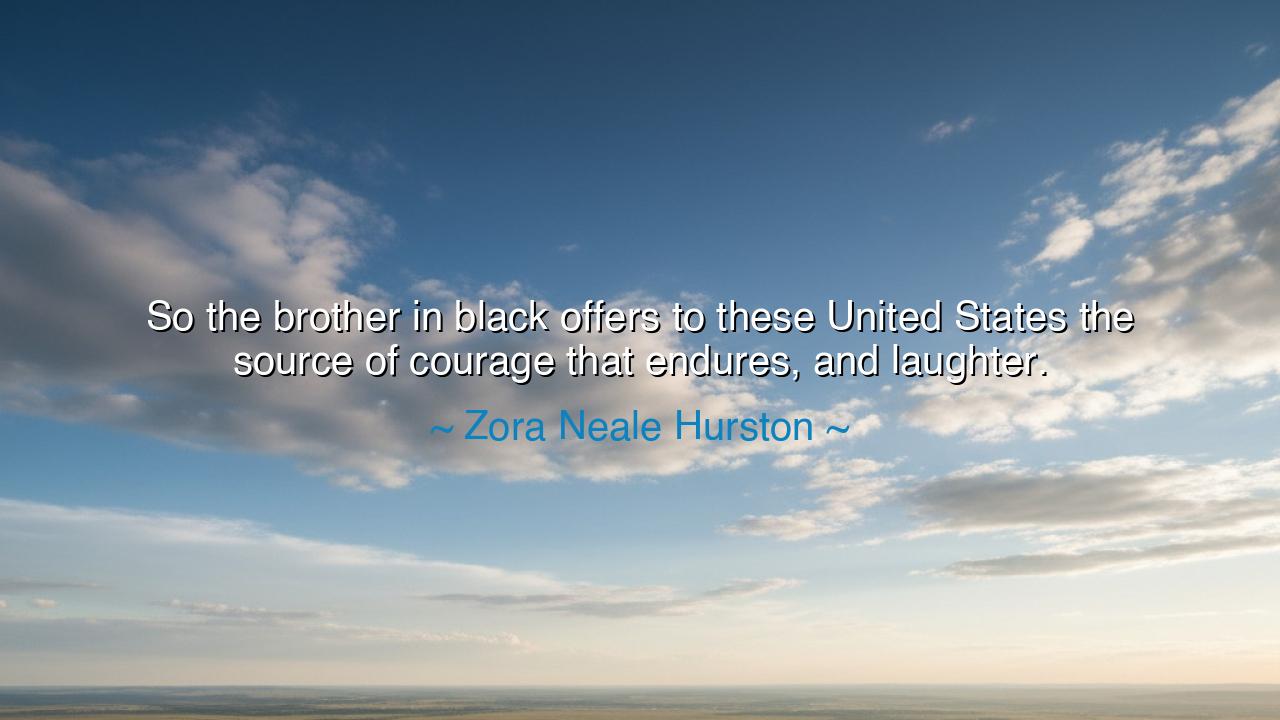
So the brother in black offers to these United States the source
So the brother in black offers to these United States the source of courage that endures, and laughter.






When Zora Neale Hurston wrote, “So the brother in black offers to these United States the source of courage that endures, and laughter,” she was not simply describing a people, but revealing a sacred gift—a gift born from centuries of struggle, resilience, and joy. Her words stand as both testimony and triumph: that from the soil of suffering grows the flower of courage, and from the heart of endurance rises the music of laughter. In this one line, she captures the unbreakable spirit of Black America—the power to face pain and still sing, to bear injustice and yet build joy, to turn grief into strength and oppression into art.
Hurston, one of the most luminous voices of the Harlem Renaissance, spoke with the authority of a woman who had seen both the hardship and the holiness of life. In her essays and novels, she celebrated the beauty, intelligence, and cultural richness of Black life in the American South. This quote, taken from her 1928 essay “How It Feels to Be Colored Me,” is a declaration of identity and defiance. At a time when racial prejudice sought to define and diminish her people, Hurston refused victimhood. Instead, she offered the world a mirror of grace and power, saying in essence: We are not broken; we are the source of something eternal—the courage that endures, and the laughter that redeems.
The origin of this statement lies in the historical soul of a people who endured what should have destroyed them. From the dark hold of slave ships to the burning fields of the plantation, from chains to Jim Crow, the story of Black America is one of unimaginable trial. Yet, through it all, they preserved the spark of humanity—through songs, through prayer, through humor, through community. Hurston recognized that in their survival was a kind of moral inheritance, one that all nations could learn from: a courage that does not come from conquest, but from endurance; and a laughter that does not mock suffering, but transcends it.
To understand this truth, one need only look to the life of Frederick Douglass, who rose from bondage to become one of the greatest orators and reformers of his age. His life was shaped by pain, but he refused to let pain define him. His eloquence, his strength, and even his humor became weapons against despair. Or consider the civil rights marchers of the 1960s—men and women who faced dogs and firehoses with songs on their lips, whose laughter and faith disarmed the cruelty of those who sought to silence them. Hurston saw in these acts not just resistance, but revelation: that joy itself can be an act of revolution, and courage an inheritance passed down through song and story.
Hurston’s wisdom is deeply spiritual, for it teaches that laughter is not a denial of pain but its transformation. The enslaved mother who rocked her child and whispered hope, the blues singer who turned heartbreak into melody, the preacher who thundered of freedom while chains still clanked—all were part of this divine alchemy. Their joy was not naive—it was radical. It declared that the human spirit, once awakened, cannot be conquered. Thus, when Hurston says the “brother in black offers… courage that endures,” she means that the African American spirit gives this nation its moral backbone, its reminder that dignity can survive degradation and still rise singing.
But she offers more than remembrance; she offers a lesson. For courage and laughter are not confined to one people or one time—they are the medicine of all who live. Every soul will face its own bondage—be it fear, loss, or hardship—and in those moments, Hurston’s words become a guide. She teaches that to endure with courage is to affirm life, and to laugh in the face of pain is to reclaim power from despair. The one who can laugh still believes in the future; the one who endures still shapes it.
So, my children of history and hope, take this teaching into your hearts: let courage and laughter be your inheritance. When the world grows heavy, remember those who bore far heavier burdens and still danced beneath the stars. When life wounds you, do not let bitterness take root—turn your sorrow into song. As Zora Neale Hurston proclaimed, the truest strength is not in conquest but in compassion, not in dominance but in endurance. The brother in black, she said, gave America its example of unconquerable spirit; may each of us honor that gift by living likewise—with courage that does not falter, and laughter that will not die.
For in the end, these are the twin pillars of the soul: courage, which keeps us standing, and laughter, which keeps us human. And through them, as Hurston knew, we not only survive the storms of the world—we teach others how to live.






AAdministratorAdministrator
Welcome, honored guests. Please leave a comment, we will respond soon